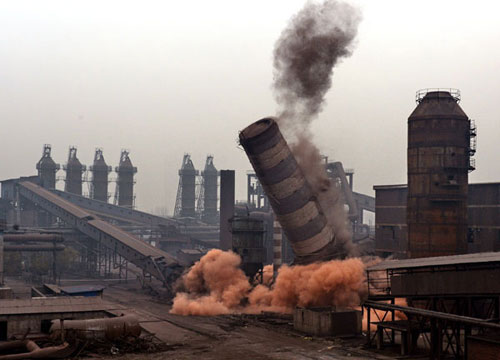Hebei aims for pollution fight to bear fruit
 0 Comment(s)
0 Comment(s) Print
Print E-mail China Daily, December 26, 2013
E-mail China Daily, December 26, 2013
Liu Dashan opened a paper bag and took out an apple only slightly larger than a squash ball.
"Without this bag, the apple would be covered in thick dust, just like I am when I go to harvest my fruit," Liu said as he bent down and took a persimmon from his basket.
 |
|
A 450 cubic-meter furnace was demolished in Tangshan, Hebei province, in November as part of efforts to improve air quality. [Photo/Xinhua] |
"The other farmers can sell their persimmons wholesale for almost 2 yuan (33 US cents) a kilo, but no one wants to buy mine, even if I set the price at 1 yuan a kilo, because the retailers say they are so dirty and deformed that they can't get a good price for them."
Liu, who is in his 60s, waved the fruit in his hands and pointed at his orchard 1,000 meters away, standing in the shadow of a steel plant.
Like many residents of Yutian, a county in Tangshan, Hebei province, he blames the private plant, which employs about 1,500 people, for the dust and pollution that are ruining his business.
The company says it has compensated Liu for his losses, but he denies receiving any money.
Uncovered piles of raw materials, including corrosive lime, were dotted randomly around the factory yard, and yellow fumes poured from the chimney of a blast furnace, blending with a gray sky.
Although the company recently installed dust-prevention and reduction technology, Liu said he hasn't noticed a difference: "My mouth still gets clogged with ash when there's no wind to disperse it," he said.
Low utilization rate
Although "Beijing Cough", the rasping respiratory ailment that's become associated with the Chinese capital in recent years, has attracted worldwide attention and resulted in some expats relocating to healthier climes, airborne pollution is far worse in smaller industrial cities, especially those in Hebei.
Cities in the province regularly occupy as many as seven places on a list of the 10 most-polluted places nationwide, which is published by the Environmental Protection Ministry every month. As a result, the province, which surrounds Beijing, is always seen as the main culprit when talk turns to air pollution in the capital.
"No one - those who formulate national policies, environmentalists, the general public and the market - will allow Hebei to continue supporting industries that produce high levels of pollution but few benefits," said Zhou Benshun, Hebei's Party chief. "Projects that are profitable in the short term but do long-term damage will not be tolerated in the future."
Shijiazhuang, Baoding, Xingtai, Tangshan, Handan, Langfang and Hengshui, the seven cities on the nation's most-polluted list, have one thing in common: each is home to at least one highly polluting industry, such as coal, steel, cement and glass.
Hebei produced about 178 million metric tons of crude steel between January and November, outstripping the 169 million tons produced in 2012 by the 27 countries (at the time) in the European Union, according to the World Steel Association's Steel Statistical Yearbook 2013.
The high concentration of steel works in Hebei is evident from the comparative sizes - the EU covers an area of approximately 4 million square kilometers, more than 20 times that of Hebei.
Although steel production is high, the utilization rate of 72 percent is low. In the United States and Japan, a rate lower than 78 percent is normally deemed overcapacity, according to China Metallurgical News.
Although some small companies went to the wall during the market downturn, others, especially, private enterprises, maintained profitability by lowering their costs through the use of cheaper, lower standard raw materials, by purchasing older machinery and equipment from rival companies or by blatantly ignoring government antipollution regulations, said Xu Xiangchun, information director of the industry consultancy Mysteel.
In an attempt to solve the problem, the central government plans to cut 80 million metric tons of steel production capacity nationally by the end of 2017, according to guidelines issued in October. Hebei will be required to cut 60 million tons out of the national total, while Tangshan, a city located close to Liu's orchard, alone has a reduction quota of 40 million tons.





